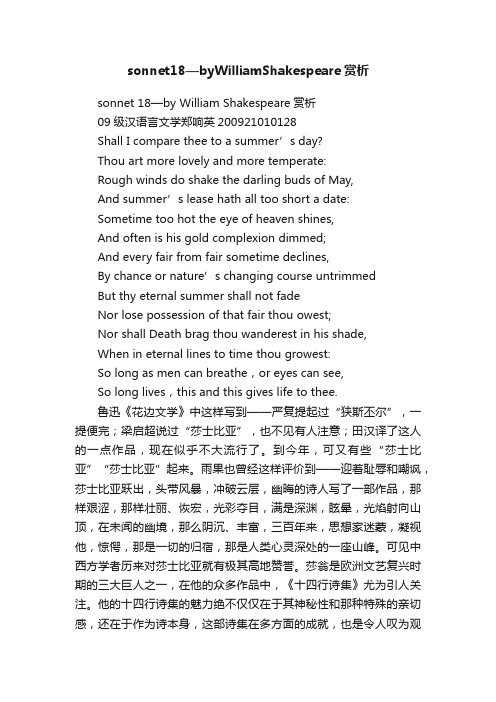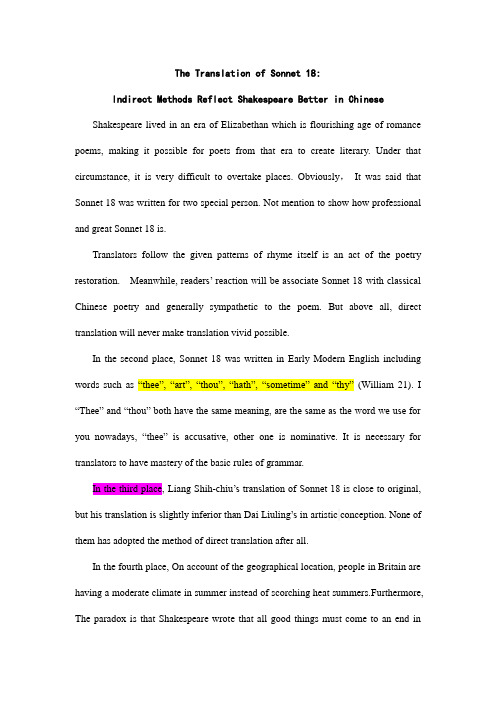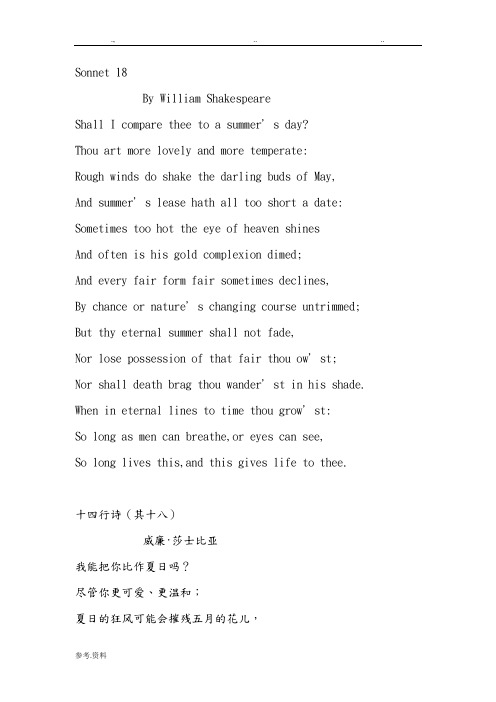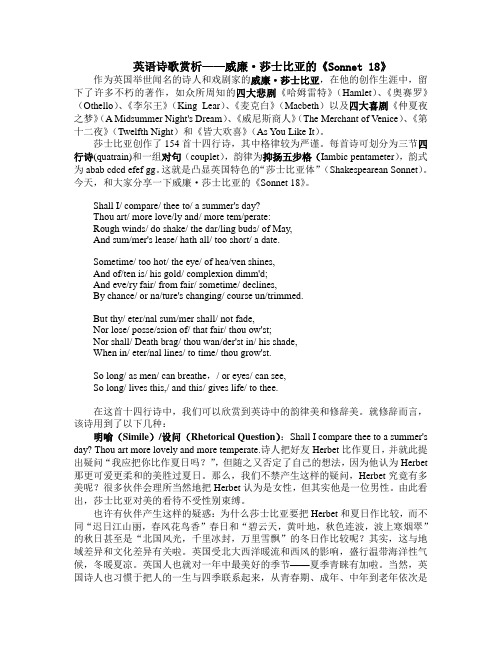Sonnet18(英文赏析)
sonnet18—byWilliamShakespeare赏析

sonnet18—byWilliamShakespeare赏析sonnet 18—by William Shakespeare赏析09级汉语言文学郑响英200921010128Shall I compare thee to a summer’s day?Thou art more lovely and more temperate:Rough winds do shake the darling buds of May,And summer’s lease hath all too short a date:Sometime too hot the eye of heaven shines,And often is his gold complexion dimmed;And every fair from fair sometime declines,By chance or nature’s changing course untrimmedBut thy eternal summer shall not fadeNor lose possession of that fair thou owest;Nor shall Death brag thou wanderest in his shade,When in eternal lines to time thou growest:So long as men can breathe,or eyes can see,So long lives,this and this gives life to thee.鲁迅《花边文学》中这样写到——严复提起过“狭斯丕尔”,一提便完;梁启超说过“莎士比亚”,也不见有人注意;田汉译了这人的一点作品,现在似乎不大流行了。
到今年,可又有些“莎士比亚”“莎士比亚”起来。
雨果也曾经这样评价到——迎着耻辱和嘲讽,莎士比亚跃出,头带风暴,冲破云层,幽晦的诗人写了一部作品,那样艰涩,那样壮丽、恢宏,光彩夺目,满是深渊,眩晕,光焰射向山顶,在未闻的幽境,那么阴沉、丰富,三百年来,思想家迷蒙,凝视他,惊愕,那是一切的归宿,那是人类心灵深处的一座山峰。
莎士比亚十四行诗第十八首的英文评论和赏析

莎士比亚十四行诗第十八首的英文评论和赏析◎ 莎士比亚十四行诗第18首◇ 曹明伦译18 18我是否可以把你比喻成夏天?Shall I compare thee to a summer's day?虽然你比夏天更可爱更温和: Thou art more lovely and more temperate:狂风会使五月娇蕾红消香断,Rough winds do shake the darling buds of May,夏天拥有的时日也转瞬即过; And summer's lease hath all too short a date:有时天空之巨眼目光太炽热,Sometime too hot the eye of heaven shines,它金灿灿的面色也常被遮暗; And often is his gold complexion dimmed,而千芳万艳都终将凋零飘落,And every fair from fair sometime declines,被时运天道之更替剥尽红颜; By chance, or nature's changing course untrimmed:但你永恒的夏天将没有止尽, But thy eternal summer shall not fade,你所拥有的美貌也不会消失, Nor lose possession of that fair thou ow'st,死神终难夸口你游荡于死荫,Nor shall death brag thou wander'st in his shade,当你在不朽的诗中永葆盛时;When in eternal lines to time thou grow'st,只要有人类生存,或人有眼睛,So long as men can breathe, or eyes can see,我的诗就会流传并赋予你生命。
莎士比亚-sonnet-18-29-66的中文翻译及评析

18莎士比亚的十四行诗总体上表现了一个思想:爱征服一切。
他的诗充分肯定了人的价值、赞颂了人的尊严、个人的理性作用。
诗人将抽象的概念转化成具体的形象,用可感可见的物质世界,形象生动地阐释了人文主义的命题。
诗的开头将“你”和夏天相比较。
自然界的夏天正处在绿的世界中,万物繁茂地生长着,繁阴遮地,是自然界的生命最昌盛的时刻。
那醉人的绿与鲜艳的花一道,将夏天打扮得五彩缤纷、艳丽动人。
但是,“你”却比夏天可爱多了,比夏天还要温婉。
五月的狂风会作践那可爱的景色,夏天的期限太短,阳光酷热地照射在繁阴班驳的大地上,那熠熠生辉的美丽不免要在时间的流动中凋残。
这自然界最美的季节和“你”相比也要逊色不少。
而“你”能克服这些自然界的不足。
“你”在最灿烂的季节不会凋谢,甚至“你”美的任何东西都不会有所损失。
“你”是人世的永恒,“你”会让死神的黑影在遥远的地方停留,任由死神的夸口也不会死去。
“你”是什么?“你”与人类同在,你在时间的长河里不朽。
那人类精神的精华——诗,是你的形体吗?或者,你就是诗的精神,就是人类的灵魂。
诗歌在形式上一改传统的意大利十四行诗四四三三体,而是采用了四四四二体:在前面充分地发挥表达的层次,在充分的铺垫之后,用两句诗结束全诗,点明主题。
全诗用新颖巧妙的比喻,华美而恰当的修饰使人物形象鲜明、生气鲜活。
诗人用形象的表达使严谨的逻辑推理变得生动有趣、曲折跌宕,最终巧妙地得出了人文主义的结论。
二十九首就是其中的一首。
这首诗热情地歌颂爱情,诗人在创作这首诗时,充分发挥了十四行诗的长处,采用了“先抑后扬”手法,层层推进,波澜起伏,道出了诗人的思想感情发展变化过程,开头四句这样写道:When ,in disgrace with Fortune and men’ eyes ,sI all alone beweep my outcast state ,And trouble deaf heaven with my bootless cries ,And look upon myself ,and curse my fate ,从这四句我们可以读出,一开始诗人悲悲切切地唱出自己的悲惨处境“in disgrace with Fortune and,men’ eyes (失去了幸福,又遭人白眼。
sonnet18 的英文赏析(部分)

The Translation of Sonnet 18:Indirect Methods Reflect Shakespeare Better in Chinese Shakespeare lived in an era of Elizabethan which is flourishing age of romance poems, making it possible for poets from that era to create literary. Under that circumstance, it is very difficult to overtake places. Obviously,It was said that Sonnet 18 was written for two special person. Not mention to show how professional and great Sonnet 18 is.Translators follow the given patterns of rhyme itself is an act of the poetry restoration. Meanwhile, readers’ reaction will be associate Sonnet 18 with classical Chinese poetry and generally sympathetic to the poem. But above all, direct translation will never make translation vivid possible.In the second place, Sonnet 18 was written in Early Modern English including words such as “thee”, “art”, “thou”, “hath”, “sometime” and “thy”(William 21). I “Thee” and “thou” both have the same meaning, are the same as the word we use for you nowadays, “thee” is accusative, other one is nominative. It is necessary for translators to have mastery of the basic rules of grammar.In the third place, Liang Shih-chiu’s translation of Sonnet 18 is close to original, but his translation is slightly inferior than Dai Liuling’s in artistic conception. None of them has adopted the method of direct translation after all.In the fourth place, On account of the geographical location, people in Britain are having a moderate climate in summer instead of scorching heat summers.Furthermore, The paradox is that Shakespeare wrote that all good things must come to an end inline 7, line 8 is actually doing matting to the next lines,.In the eyes of Shakespeare, there is no doubt that “thou” will s pread through the ages just like what he wrote in his las t two lines are expressed by “men can breathe”, “eyes can see” (William 21).In the fifth place, Sonnet 18 is not perfect despite its classic, indirect translation is a vital part during propagation. Most of the college student s don’t appreciate Sonnet 18 based on teaching investigation. It is normal that classical poetry are n’t popular, but it is vain to ascribe this phenomenon to readers or the society. Few people can look again for the classical poetry. However, flaws in text itself maybe the reason why they are unpopular. On the one hand, although Sonnet 18 consists of three quatrains and a couplet, the rhyme isn’t neat. The stress placement of the end rhyme are difference, despite “temperate” in line 2 and “date” in line 4 are end with “ate”. Compared with the other lines, this rhyme is abrupt. The two “ands” in the beginning of line 6 and line 7 should function as a progressive alliteration rather than a parallel one. Meter, rhyme and stanza, in the right hands, can be inescapably precise as to tone, rhythm, emphasis and the stages of the argument. Shakespeare was overdoing it in Sonnet 18, it’s disrupted the form of Sonnet 18 and fragmented the melody and rhythm. All these factors had negative impact on Sonnet 18. Actually, the readers foun d that difficult to read bumpy sentences. On the other hand, “And every fair from fair sometime declines”(William 21) was written in obscure way that readers may feel abstract. “Summer” has a lease but the lease is short, from “And summer’s lease hath all too short a date” (William 21) in line 4. The sheer aesthetics that Shakespeare goes for in some ways readers may feel strange. There were anthropomorphic, forexample, “death” doesn’t exist, not to mention that it could brag, but this descriptive method is commonplace for such a classical poem. It is a truth acknowledged by anyone that life is short and time is swift, simple truth are told in the presentation of complex information, readers may not feel cordiality and geniality. Indirect translation can put original version into a band new one, to avoid this situation and make the work get better and better, especially be particularly important for readers under this circumstances. Direct translation will never make that happen and only make matters worse.When I learnt an ancient poem as a pupil, I wasn’t learning at the right level, I just learnt the words, not the message, then I asked my teacher for help. My teacher Would told me about the profound intent. When I read a poem, especially the translatio n, it’s not just about the literal meaning, I want to know the inner meaning of it, including its cultural background, historical origin and so on. After reading, I must learn some new knowledge, that’s the meaning of reading. Indirect translation is like my teacher, making my read smoothly and understandingly.Sonnet 18 is one of the most beautiful sonnets written by Shakespeare. In this sonnet, the poet writes beautifully on the conventional theme that his poetry will bring eternity to the one he loves a nd eulogizes. However, it’s more than that.Conceptual Blending Theory is used in this paper to analyze why literal translation and liberal translation arise in translation. It points out that, when translating the rhetorical devices in English titles, both translational equivalence and functional equivalence can be taken as the criteria.。
莎士比亚 sonnet 18 29 66的中文翻译及评析

18莎士比亚的十四行诗总体上表现了一个思想:爱征服一切。
他的诗充分肯定了人的价值、赞颂了人的尊严、个人的理性作用。
诗人将抽象的概念转化成具体的形象,用可感可见的物质世界,形象生动地阐释了人文主义的命题。
诗的开头将“你”和夏天相比较。
自然界的夏天正处在绿的世界中,万物繁茂地生长着,繁阴遮地,是自然界的生命最昌盛的时刻。
那醉人的绿与鲜艳的花一道,将夏天打扮得五彩缤纷、艳丽动人。
但是,“你”却比夏天可爱多了,比夏天还要温婉。
五月的狂风会作践那可爱的景色,夏天的期限太短,阳光酷热地照射在繁阴班驳的大地上,那熠熠生辉的美丽不免要在时间的流动中凋残。
这自然界最美的季节和“你”相比也要逊色不少。
而“你”能克服这些自然界的不足。
“你”在最灿烂的季节不会凋谢,甚至“你”美的任何东西都不会有所损失。
“你”是人世的永恒,“你”会让死神的黑影在遥远的地方停留,任由死神的夸口也不会死去。
“你”是什么?“你”与人类同在,你在时间的长河里不朽。
那人类精神的精华——诗,是你的形体吗?或者,你就是诗的精神,就是人类的灵魂。
诗歌在形式上一改传统的意大利十四行诗四四三三体,而是采用了四四四二体:在前面充分地发挥表达的层次,在充分的铺垫之后,用两句诗结束全诗,点明主题。
全诗用新颖巧妙的比喻,华美而恰当的修饰使人物形象鲜明、生气鲜活。
诗人用形象的表达使严谨的逻辑推理变得生动有趣、曲折跌宕,最终巧妙地得出了人文主义的结论。
二十九首就是其中的一首。
这首诗热情地歌颂爱情,诗人在创作这首诗时,充分发挥了十四行诗的长处,采用了“先抑后扬”手法,层层推进,波澜起伏,道出了诗人的思想感情发展变化过程,开头四句这样写道:When ,in disgrace with Fortune and men’ eyes ,sI all alone beweep my outcast state ,And trouble deaf heaven with my bootless cries ,And look upon myself ,and curse my fate ,从这四句我们可以读出,一开始诗人悲悲切切地唱出自己的悲惨处境“in disgrace with Fortune and,men’ eyes (失去了幸福,又遭人白眼。
Sonnet 18(英文赏析)

Sonnet 18By William ShakespeareShall I compare thee to a summer’s day?Thou art more lovely and more temperate:Rough winds do shake the darling buds of May, And summer’s lease hath all too short a date: Sometimes too hot the eye of heaven shinesAnd often is his gold complexion dimed;And every fair form fair sometimes declines,By chance or nature’s changing course untrimmed; But thy eternal summer shall not fade,Nor lose possession of that fair thou ow’st;Nor shall death brag thou wander’st in his shade. When in eternal lines to time thou grow’st:So long as men can breathe,or eyes can see,So long lives this,and this gives life to thee.十四行诗(其十八)威廉·莎士比亚我能把你比作夏日吗?尽管你更可爱、更温和;夏日的狂风可能会摧残五月的花儿,季节的限制又减少了可拥有的日光;天空的巨眼有时过于灼热,常使自身的辉煌无故湮没;每一种美都会消逝,不管愿意或是无奈;然而你这盛夏将永存不朽,连你所有的美都不会褪去;死神不忍逼近,生命只会长存;只要人类能呼吸,能看见;我的诗就会存在,而你的生命也会延续。
赏析威廉莎士比亚的十四行诗

英语诗歌赏析——威廉·莎士比亚的《Sonnet 18》作为英国举世闻名的诗人和戏剧家的威廉·莎士比亚,在他的创作生涯中,留下了许多不朽的著作,如众所周知的四大悲剧《哈姆雷特》(Hamlet)、《奥赛罗》(Othello)、《李尔王》(King Lear)、《麦克白》(Macbeth)以及四大喜剧《仲夏夜之梦》(A Midsummer Night's Dream)、《威尼斯商人》(The Merchant of Venice)、《第十二夜》(Twelfth Night)和《皆大欢喜》(As You Like It)。
莎士比亚创作了154首十四行诗,其中格律较为严谨。
每首诗可划分为三节四行诗(quatrain)和一组对句(couplet),韵律为抑扬五步格(Iambic pentameter),韵式为abab cdcd efef gg。
这就是凸显英国特色的“莎士比亚体”(Shakespearean Sonnet)。
今天,和大家分享一下威廉·莎士比亚的《Sonnet 18》。
Shall I/ compare/ thee to/ a summer's day?Thou art/ more love/ly and/ more tem/perate:Rough winds/ do shake/ the dar/ling buds/ of May,And sum/mer's lease/ hath all/ too short/ a date.Sometime/ too hot/ the eye/ of hea/ven shines,And of/ten is/ his gold/ complexion dimm'd;And eve/ry fair/ from fair/ sometime/ declines,By chance/ or na/ture's changing/ course un/trimmed.But thy/ eter/nal sum/mer shall/ not fade,Nor lose/ posse/ssion of/ that fair/ thou ow'st;Nor shall/ Death brag/ thou wan/der'st in/ his shade,When in/ eter/nal lines/ to time/ thou grow'st.So long/ as men/ can breathe,/ or eyes/ can see,So long/ lives this,/ and this/ gives life/ to thee.在这首十四行诗中,我们可以欣赏到英诗中的韵律美和修辞美。
Sonnet_18(英文赏析)

Sonnet 18By William ShakespeareShall I compare thee to a summer’s day?Thou art more lovely and more temperate: Rough winds do shake the darling buds of May, And summer’s lease hath all too short a date: Sometimes too hot the eye of heaven shinesAnd often is his gold complexion dimed;And every fair form fair sometimes declines,By chance or nature’s changing course untrimmed; But thy eternal summer shall not fade,Nor lose possession of that fair thou ow’st;Nor shall death brag thou wander’st in his shade. When in eternal lines to time thou grow’st:So long as men can breathe,or eyes can see,So long lives this,and this gives life to thee.十四行诗(其十八)威廉·莎士比亚我能把你比作夏日吗?尽管你更可爱、更温和;夏日的狂风可能会摧残五月的花儿,季节的限制又减少了可拥有的日光;天空的巨眼有时过于灼热,常使自身的辉煌无故湮没;每一种美都会消逝,不管愿意或是无奈;然而你这盛夏将永存不朽,连你所有的美都不会褪去;死神不忍逼近,生命只会长存;只要人类能呼吸,能看见;我的诗就会存在,而你的生命也会延续。
- 1、下载文档前请自行甄别文档内容的完整性,平台不提供额外的编辑、内容补充、找答案等附加服务。
- 2、"仅部分预览"的文档,不可在线预览部分如存在完整性等问题,可反馈申请退款(可完整预览的文档不适用该条件!)。
- 3、如文档侵犯您的权益,请联系客服反馈,我们会尽快为您处理(人工客服工作时间:9:00-18:30)。
Sonnet 18
By William Shakespeare
Shall I compare thee to a summer’s day?
Thou art more lovely and more temperate: Rough winds do shake the darling buds of May, And summer’s lease hath all too short a date: Sometimes too hot the eye of heaven shines
And often is his gold complexion dimed;
And every fair form fair sometimes declines,
By chance or nature’s changing course untrimmed; But thy eternal summer shall not fade,
Nor lose possession of that fair thou ow’st;
Nor shall death brag thou wander’st in his shade. When in eternal lines to time thou grow’st:
So long as men can breathe,or eyes can see,
So long lives this,and this gives life to thee.
十四行诗(其十八)
威廉·莎士比亚
我能把你比作夏日吗?
尽管你更可爱、更温和;
夏日的狂风可能会摧残五月的花儿,
季节的限制又减少了可拥有的日光;
天空的巨眼有时过于灼热,
常使自身的辉煌无故湮没;
每一种美都会消逝,
不管愿意或是无奈;
然而你这盛夏将永存不朽,
连你所有的美都不会褪去;
死神不忍逼近,
生命只会长存;
只要人类能呼吸,能看见;
我的诗就会存在,而你的生命也会延续。
Sonnet 18 is absolutely one of the most famous sonnets of Shakespeare. Almost every English learner can recite some lines of it either for appreciation or pleasure as both the thematic feature and artistic feature shine brightly and attractively. In the following, I will illustrate my understanding of this sonnet in these two aspects.
Firstly, something about the sonnet’s thematic feature.
The first two lines, in the form of a question and an assertive肯定statement, show the poet’s idea of comparing his beloved with a summer’s day and also point out that the beloved person is more beautiful and less extreme than summer. It is understandable that summer is chosen as the comparison target because it is lovely and pleasant. While the next
six lines describe the less pleasant aspects of summer: the too strong wind, the extreme hot weather as well as the easy disappearance of all beauties. The ninth line takes up the comparison with summer again: summer has by now become the summer of life. The comparison turns into a contrast by referring back to the seventh. The poet's assurance becomes even firmer in lines eleven and twelve, which contain a promise that death will be conquered that the beloved one’s spirit and life will surely be eternal. The last two lines further emphasize the poet’s belief that the eternity of spirit and virtue of his beloved by pointing out the poem’s eternal function and existence.
With this arrangement of structure and content, the poet gives this sonnet two thematic meanings.The primary meaning is simply a statement to praise the beauty of the beloved one. But the more important and deep one is the poet’s thought that the power of the poem which can defy不屈服time and last forever.Its double themes are one distinguishing feature of the sonnet.
Secondly, the analysis of this sonnet’s artistic feature.
It contains 14 lines. We can easily observe that the ends of line 1 and line 3 have the end rhyme: /ei/, line 2 and line 4 rhyme with /eit/. And these four lines form a quatrain. The same form is used in the second quatrain from line 5 to line 8,the third quatrain from line 9 to line 12. However,the last two lines have their own form, as they have the end
rhyme:/i:/Each line in this sonnet is in iambic pentameter which means each line has five feet, usually an unaccented syllable followed by an accented syllable. For example, we can divide the first line into five independent feet as “Shall I / compare / thee to/ a sum / mer’s day?”With accents on shall,com,thee,a,mer respectively.
Some figures of speech are also in use like simile明喻and personification拟人. We can see the sun is regarded as “the eye of heaven” which is a simile. We can find the word “his” used to describe the sun and the death which gives them life as the illustration of the use of personification. This makes the images the poet points out linked to each other and vividly form the whole imagery.
To make a general conclusion of its stylistic feature, this sonnet is a typical Shakespearian sonnet with fourteen lines in iambic pentameter, including three quatrains and one couplet with the rhyme scheme ababcdcdefefgg. Besides this, sonnet 18 is in use of alliteration and figures of speech which add more beauty to the tonality 音调of the poem.。
